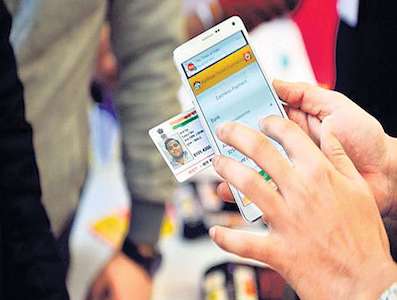
The acronym, KYC, refers to “Know Your Customer”. Prior to delivering any financial service to consumers, financial institutions such as banks and non-bank finance companies (NBFCs) are required to comply with KYC rules. KYC is used to establish and validate the identity and credentials of a client. eKYC, sometimes referred to as paperless KYC, is a procedure for electronically verifying a customer’s credentials.
At this point, you’re probably intrigued about the online KYC verification procedure. Because of the fact that electronic authentication of your identity is performed using Aadhaar-based paperwork, eKYC is sometimes referred to as Aadhaar-based eKYC. This implies that the service provider will acquire information about your Aadhaar from the database maintained by the Unique Identification Authority of India, including your name, address, gender, date of birth, telephone number, and email address (UIDAI). As a result, Aadhaar-based eKYC enables the service provider to quickly obtain evidence of your identity and address, obviating the need for time-consuming in-person verification.
Remember that Aadhaar eKYC is conditional on the UIDAI receiving the information required to generate the 12-digit Aadhaar number. If you get your Aadhaar number and then want to invest in mutual funds or create a Demat Account for stock market trading, the fund house or brokerage business will have access to your Aadhaar data through the eKYC Application Programming Interface (API). The eKYC API may then be used to verify a consumer by any licensed service provider. Remember that the online KYC verification service is only accessible to clients who have obtained UIDAI licenses.
Also Read: How To Check Your CIBIL Score Using Your Pan Card
Completing eKYC online
Table of Contents
You may complete your KYC registration quickly and easily online by submitting an application via the web portal of any of the SEBI-authorized Know Your Customer Registration Agencies (KRAs). Additional companies include CDSL Ventures Limited (CVL), NSDL Database Management Limited (NDML), DotEx International Limited (DotEx), CAMS Investor Services Private Limited, and Karvy Data Management Services Limited (KDMS).
- After creating an account on one of the KRA’s eKYC websites, you will be prompted to provide personal information.
- You will next be required to submit your Aadhaar card and registered phone number. You’ll get a one-time password immediately (OTP). You must provide a copy of your self-attested Aadhaar card after verification.
- After successfully completing your KYC online, you may check your status on the KRA’s website by entering your PAN number.
- After you’ve completed online KYC, it’s vital to remember that you may also do KYC offline.
- You just need to get the KYC form online from one of the KRAs and submit it to the appropriate authorities or person along with the required documents. You may update any of your digital KYC data, such as your name or address, by logging into any KRA’s eKYC portal.
- ‘Update KYC’ must now be selected. Then, in addition to supplying a scanned copy of the amended papers, you must complete the additional information necessary to establish the changes.
- Following that, an OTP will be sent to the mobile phone number linked with your account. Click submit after your information has been confirmed. Specifications will be changed immediately upon submission, often within a week.
Also Read: The Udyog Aadhar
How to complete Aadhaar eKYC
There are two ways to verify your KYC online using Aadhaar-based eKYC:
- This step requires you to provide your 12-digit Aadhaar number as well as biometric information like fingerprints or an iris scan. Allow us to illustrate this point with an example. If you decide to invest in mutual funds, the fund house’s authorized representative will utilize your biometrics to complete the mutual fund eKYC procedure online. A brokerage business may do a similar verification procedure while opening your Demat Account.
- When you enter your Aadhaar number, an OTP will be delivered to the cellphone number associated with your Aadhaar. After that, the transaction may be completed by entering the OTP into the device used by the service provider.
Also Read: Aadhaar Card Download – Complete Guide To Download For E-Aadhaar
Aadhaar Authentication vs Aadhaar eKYC
The Aadhaar authentication process is distinct from Aadhaar’s electronic Know Your Customer service (eKYC). While Aadhaar eKYC provides access to the customer’s data recorded in the UIDAI database, such as name, gender, and address, Aadhaar authentication checks just your credentials. In other words, you may get Aadhaar authentication without disclosing your demographic information to the service provider.
The Supreme Court issued a landmark judgment in September 2018 addressing Indian residents’ privacy concerns, most notably commercial organizations’ misuse of Aadhaar data. Private businesses were prohibited from using Aadhaar eKYC for verification reasons. The following month, UIDAI authorized commercial organizations such as banks to use Aadhaar eKYC for the purpose of authentication while giving direct benefits. However, the Aadhaar and Other Laws (Amendment) Act, 2019 enabled private businesses to do online KYC authentication.
Individuals may independently verify their identities using their Aadhaar numbers, either online via Aadhaar-based KYC or offline through eKYC. UIDAI will be responsible for enforcing established safety, security, and privacy duties against private enterprises under the new standards. Furthermore, UIDAI will only grant licenses for online KYC verification as a last option. As a result, the new restrictive requirements restrict online KYC verification to private firms that have been certified by UIDAI. This safeguards you against unauthorized use of your Aadhaar data.
Also Read: The Udyog Aadhar
Conclusion
Thus, eKYC is a paperless technique of satisfying the statutory Know Your Customer requirements before beginning your investing journey. If you want to trade in the stock markets, you may simply comply with KYC regulations using Aadhaar-based eKYC and create a Demat Account in addition to a Trading Account. If you are considering investing in mutual funds, you should be aware that SEBI restricts OTP-based eKYC mutual fund purchases to Rs 50,000 per year. If you’re prepared to pay a premium, you may choose in-person verification (IPV) or biometric verification. Always seek a skilled and trustworthy financial partner to maximize the return on your investment. IIFL can assist you in achieving your financial objectives by providing you with the finest Demat Account and a comprehensive selection of investment options.






